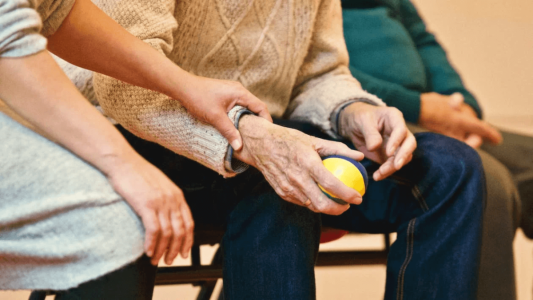Could the secret to longer life be on your plate? Anti-ageing properties have been found in this food
- Replies 3
Do you love your smile lines but hate the increased risk of age-related illnesses in your golden years? It turns out, researchers are looking into ways we can ‘age healthier’!
Specifically, there have been a number of studies that suggest astaxanthin may be beneficial for longevity. So what is it? Astaxanthin is a powerful antioxidant that is naturally produced by algae and is used as a food colouring and additive.
It is also naturally present in some types of seafood such as prawns, crab, and salmon.
A review published in the journal Functional Foods in Health and Disease in 2019 analysed the benefits of astaxanthin from three different sources: a synthetic version (made from petrochemicals), a genetically manipulated yeast-derived version, and a natural form (from algae).
During the study, natural sources of astaxanthin were found to be 14 to 90 times more effective than synthetic forms in ‘head-to-head antioxidant experiments’, prompting the authors to recommend only the natural form of astaxanthin (from algae) for human consumption.
But what does that mean and why is it important?
According to Healthline, antioxidants neutralise ‘free radicals’ in the body. While ‘free radicals’ help fight illness and infection in the body, too many can be harmful. Continued production of these free radicals in the body is said to lead to serious deterioration of the body’s condition. This has been linked to conditions such as diabetes, heart disease and cancer.

While the body also produces antioxidants, consuming foods rich in astaxanthin can also help counter harmful free radicals.
Most notably, astaxanthin is said to be a more potent antioxidant than vitamins C and E.
Another study conducted in 2017 found that the astaxanthin may play a key role in triggering an anti-ageing gene in the body.
‘All of us have the FOXO3 gene, which protects against ageing in humans,’ said Dr Bradley Willcox, one of the study’s researchers.
The FOX03 gene has been identified previously as a ‘major gene for human longevity’, though much remains to be seen as to how it exactly affects how humans age at a molecular level.
‘But about one in three persons carry a version of the FOXO3 gene that is associated with longevity. By activating the FOXO3 gene common in all humans, we can make it act like the “longevity” version,’ he explained.

In the study’s experimentation, different groups of rats were fed different amounts of astaxanthin over a two-week period. One group was fed a normal diet, while others were given high and low-dose variants.
The results of the study showed that higher expressions of the FOX03 gene were seen in the brains, skeletal muscles, heart tissue, and blood of the rats that were fed higher doses of astaxanthin.
‘Through this research, we have shown that astaxanthin “activates” the FOXO3 gene,’ Wilcox said.
Now, before you rush to your local grocery store and head straight to the seafood section, we’d like to stress that there is still much research to be done in order to fully understand astaxanthin.
Although astaxanthin has been proven to have health benefits, its wide-reaching properties remain largely unknown.
Going forward, the research focus is likely to shift towards its specific role in longevity.
Other potential applications, such as its potential to combat Alzheimer's disease and muscle soreness from exercise, may also be explored.

Unfortunately, currently, ‘there is no good scientific evidence’ to support the use of astaxanthin for other health issues.
WebMD also warns that those who take astaxanthin might have increased bowel movements, stomach pain, or red stools.
While a quick search online might reveal supplements readily available (the Therapeutic Goods Administration has it listed as a medicine), we highly suggest getting in touch first with your doctor if you’re thinking of trying it out as we are (unfortunately) not doctors.
Besides, simple things like drinking a glass of water daily or going out to socialise and exercise might achieve the same results you want without the added cost.
So, what do you think? Has this story piqued your interest, or would you prefer to stick to more traditional ways of ageing?
We’re keen to hear your thoughts!
Specifically, there have been a number of studies that suggest astaxanthin may be beneficial for longevity. So what is it? Astaxanthin is a powerful antioxidant that is naturally produced by algae and is used as a food colouring and additive.
It is also naturally present in some types of seafood such as prawns, crab, and salmon.
A review published in the journal Functional Foods in Health and Disease in 2019 analysed the benefits of astaxanthin from three different sources: a synthetic version (made from petrochemicals), a genetically manipulated yeast-derived version, and a natural form (from algae).
During the study, natural sources of astaxanthin were found to be 14 to 90 times more effective than synthetic forms in ‘head-to-head antioxidant experiments’, prompting the authors to recommend only the natural form of astaxanthin (from algae) for human consumption.
But what does that mean and why is it important?
According to Healthline, antioxidants neutralise ‘free radicals’ in the body. While ‘free radicals’ help fight illness and infection in the body, too many can be harmful. Continued production of these free radicals in the body is said to lead to serious deterioration of the body’s condition. This has been linked to conditions such as diabetes, heart disease and cancer.

Seafood such as prawns, crabs, and salmon are rich sources of astaxanthin. Stock Image Credit: Pexels/奥尼尔 孙
While the body also produces antioxidants, consuming foods rich in astaxanthin can also help counter harmful free radicals.
Most notably, astaxanthin is said to be a more potent antioxidant than vitamins C and E.
Another study conducted in 2017 found that the astaxanthin may play a key role in triggering an anti-ageing gene in the body.
‘All of us have the FOXO3 gene, which protects against ageing in humans,’ said Dr Bradley Willcox, one of the study’s researchers.
The FOX03 gene has been identified previously as a ‘major gene for human longevity’, though much remains to be seen as to how it exactly affects how humans age at a molecular level.
‘But about one in three persons carry a version of the FOXO3 gene that is associated with longevity. By activating the FOXO3 gene common in all humans, we can make it act like the “longevity” version,’ he explained.

FOX03 is a gene linked to ageing-related processes in the body. Stock Image Credit: Pexels/Matthias Zomer
In the study’s experimentation, different groups of rats were fed different amounts of astaxanthin over a two-week period. One group was fed a normal diet, while others were given high and low-dose variants.
The results of the study showed that higher expressions of the FOX03 gene were seen in the brains, skeletal muscles, heart tissue, and blood of the rats that were fed higher doses of astaxanthin.
‘Through this research, we have shown that astaxanthin “activates” the FOXO3 gene,’ Wilcox said.
Now, before you rush to your local grocery store and head straight to the seafood section, we’d like to stress that there is still much research to be done in order to fully understand astaxanthin.
Although astaxanthin has been proven to have health benefits, its wide-reaching properties remain largely unknown.
Going forward, the research focus is likely to shift towards its specific role in longevity.
Other potential applications, such as its potential to combat Alzheimer's disease and muscle soreness from exercise, may also be explored.
Key Takeaways
- Astaxanthin is a powerful naturally-occurring antioxidant found in some seafood types.
- Antioxidants can help neutralise so-called 'free radicals' in the body, which are harmful in excess amounts and have been linked to diseases like cancer and heart disease.
- Astaxanthin is said to be a more potent antioxidant compared to vitamin C and E.
- A 2019 study found that the natural form of astaxanthin is best fit for human consumption.
- Another study in 2017 also found that astaxanthin triggered more of a gene linked to ageing in mice that consumed higher amounts.
- Much remains to be explored in terms of astaxanthin's effects despite encouraging early results.
WebMD also warns that those who take astaxanthin might have increased bowel movements, stomach pain, or red stools.
While a quick search online might reveal supplements readily available (the Therapeutic Goods Administration has it listed as a medicine), we highly suggest getting in touch first with your doctor if you’re thinking of trying it out as we are (unfortunately) not doctors.
Besides, simple things like drinking a glass of water daily or going out to socialise and exercise might achieve the same results you want without the added cost.
So, what do you think? Has this story piqued your interest, or would you prefer to stick to more traditional ways of ageing?
We’re keen to hear your thoughts!







